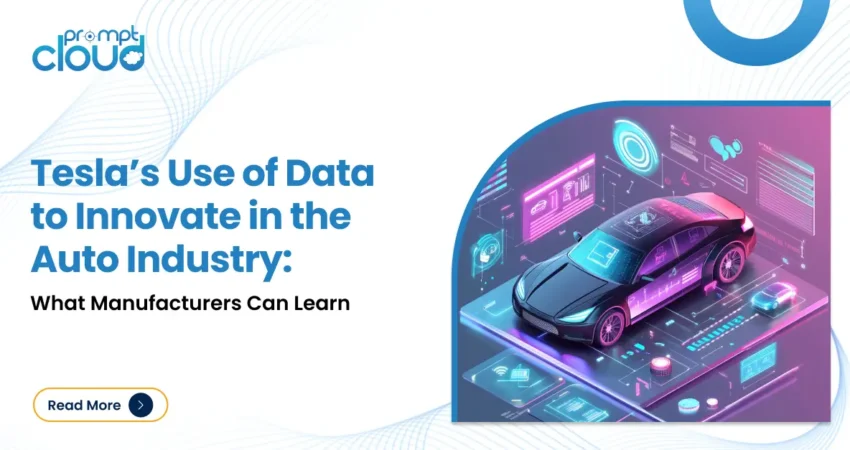
The automotive industry has undergone a digital transformation, with data at the heart of that change. While many companies have embraced automotive data solutions, few have done so as comprehensively as Tesla. Tesla’s innovative use of data has helped it redefine the automobile not just as a machine, but as a smart, connected system capable of continuous improvement.
In this article, we’ll explore how Tesla leverages data to drive innovation in the auto industry and how automotive data solutions play a pivotal role in vehicle performance, autonomous driving, and customer experience.
Why Data Is Critical in the Automotive Industry?
The modern car is no longer just a mechanical device. It’s a data-generating machine that collects massive amounts of information about driving patterns, vehicle performance, road conditions, and more. Automotive data solutions allow manufacturers like Tesla to collect, analyze, and leverage this data to enhance safety, optimize vehicle performance, and provide a better user experience.
Data in the auto industry helps with:
- Improving vehicle performance through real-time monitoring.
- Enhancing driver safety with predictive analytics.
- Personalizing the driving experience using AI and machine learning.
- Accelerating innovation in autonomous driving.
For Tesla, data is the foundation of its success. Let’s dive deeper into how the company uses automotive data solutions to innovate and stay ahead of the competition.
How Tesla Uses Automotive Data Solutions to Drive Innovation?
Tesla’s approach to data goes beyond simply collecting information – it’s about using that data to improve products continuously. Here’s how Tesla is leveraging data to innovate in the auto industry:
1. Vehicle Performance Optimization
Tesla’s vehicles are equipped with sensors that monitor every aspect of performance, from battery life to braking patterns. These sensors generate vast amounts of data that Tesla analyzes to make real-time updates and improvements to the vehicle.
How Tesla Collects Performance Data?
- Vehicle Sensors: Tesla vehicles are packed with sensors that track everything from motor performance to tire pressure, braking force, and temperature changes.
- Over-the-Air (OTA) Updates: Tesla sends software updates remotely to improve performance based on the data it collects. These updates can improve battery efficiency, adjust braking systems, or even enhance acceleration without requiring a physical service.
The Impact:
- Tesla can improve the efficiency of its vehicles after they’ve left the factory, delivering a car that gets better over time.
- OTA updates based on data analysis reduce the need for costly recalls and service visits.
2. Autonomous Driving: AI and Data at the Core
Tesla’s vision for autonomous driving relies heavily on data. The company collects billions of miles of driving data from its global fleet to continuously improve its Full Self-Driving (FSD) technology. Tesla’s AI algorithms use this data to learn how to navigate real-world driving conditions, improving the accuracy and safety of its autonomous systems.
How Tesla Uses Data for Autonomous Driving?
- Fleet Data: Every Tesla vehicle on the road serves as a data source, providing real-time driving data from diverse conditions around the world.
- Machine Learning Models: Tesla’s AI analyzes driving data to identify patterns and teach the FSD system how to react in specific situations, such as lane changes, merging traffic, and road hazards.
The Impact:
- Tesla’s autonomous driving system improves with every mile driven, refining the accuracy of decisions made by its AI system.
- The use of real-time driving data allows Tesla to train its AI to handle scenarios that can’t be replicated in a lab environment, such as unexpected pedestrian movements or erratic driver behavior.
3. Predictive Maintenance: Avoiding Problems
Tesla also uses data-driven automotive solutions to anticipate and prevent issues before they affect the vehicle. Through constant monitoring of vehicle components, Tesla’s system can identify potential problems and notify the driver to schedule maintenance, reducing breakdowns and costly repairs.
How Tesla Leverages Predictive Data?
- Component Monitoring: Sensors track the performance of critical components like the battery, motor, and brakes. Any deviation from normal performance triggers an alert.
- Cloud-Based Data Analysis: Tesla analyzes the data from its entire fleet to identify trends that could indicate future issues, allowing for predictive maintenance schedules.
The Impact:
- Tesla’s data-driven maintenance system helps minimize downtime and extends vehicle lifespan.
- By using predictive analytics, Tesla can prevent small issues from turning into major problems, reducing repair costs for both Tesla and the customer.
4. Enhancing Customer Experience: Personalized and Data-Driven
Tesla uses data to create a more personalized driving experience for its customers. Every time a Tesla owner uses the car, the system collects data to learn the driver’s preferences – from seat position to climate control settings—and uses this information to provide a more tailored experience.
How Tesla Personalizes the Experience?
- Driver Profiles: Tesla vehicles can store individual profiles for each driver, remembering settings such as seat height, mirror angles, and preferred driving modes.
- AI Recommendations: By analyzing driving patterns, Tesla’s system can recommend more energy-efficient routes or suggest when to charge the battery to optimize range.
The Impact:
- Tesla’s data-powered personalization features enhance customer satisfaction by delivering a seamless, tailored experience that adapts to the driver’s needs.
- AI-driven insights help Tesla owners make more informed decisions about their driving habits, improving overall vehicle efficiency.
How Automotive Data Solutions are Shaping the Future?
Tesla’s success with data highlights a broader trend in the auto industry: the growing importance of automotive data solutions. From autonomous vehicles to connected car features, data is driving innovation at every turn. Here are a few ways automotive data solutions are shaping the future of the industry:
AI-Driven Innovation
Companies are increasingly using AI models trained on real-time driving data to improve safety features, enhance in-car experiences, and optimize vehicle performance.
Real-Time Data for Predictive Analytics
Real-time data collection allows manufacturers to identify and address potential issues early, improving vehicle reliability and reducing the need for recalls.
Personalized Experiences
As data collection becomes more sophisticated, automotive companies are using this information to create personalized driving experiences that go beyond basic preferences.
Continuous Improvement Through OTA Updates
Automotive companies are adopting Tesla’s approach to over-the-air updates, allowing them to update software and improve vehicle performance post-sale, delivering cars that get better over time.
Conclusion:
Tesla’s innovative use of automotive data solutions has set a new standard for the industry, demonstrating how leveraging data can improve vehicle performance, enhance autonomous driving capabilities, and provide a more personalized experience for customers.
As data continues to play a pivotal role in shaping the future of the automotive industry, companies that embrace data-driven innovation will be better positioned to lead the market.
At PromptCloud, we specialize in helping companies leverage the power of data to drive innovation in the automotive industry. Whether you need real-time data for predictive maintenance, customer insights, or vehicle performance monitoring, our managed web scraping services ensure that you get the clean, actionable data you need.
Get in touch with us to learn how our automotive data solutions can help you stay ahead of the competition.




















